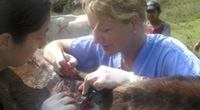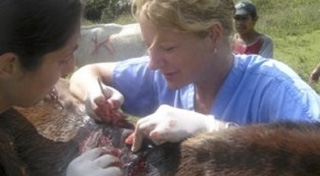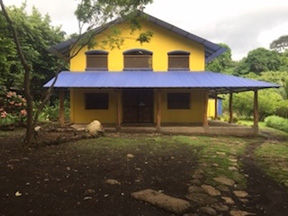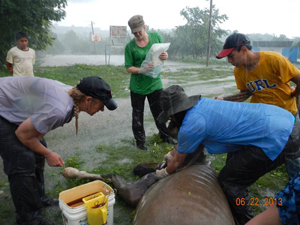Dr. Shelley Lenz uses training, medicine to empower impoverished region

Shelley Lenz 288

Photo courtesy of Dr. Shelley Lenz
Dr. Shelley Lenz's humanitarian work in Nicaragua involves lifting up communities via resources, and most important, education. She uses agricultural knowledge and medical expertise as a foundation for teaching others how to better care for themselves and their animals. "The suffering of animals will never be less than the suffering of people," she said.
Millions of animals across Central America suffer from ailments that could be cured with access to modern medical care. The same is true of people living where government instability and corruption breeds poverty, which stifles employment and education.
For those fortunate to live on a picturesque island in Lake Nicaragua, there is a lifeline — a veterinarian from North Dakota named Dr. Shelley Lenz.
In 2013, Lenz purchased a 40-acre plot on Ometepe Island in Nicaragua, near the Costa Rican border. In the years since, she has learned to adapt culturally and navigate a governance system rife with instability to build a thriving veterinary clinic and a permaculture farm, where the area's residents are employed, fed and trained to better care for themselves and their animals.
"Once you see the people here, you get so energized," she said. "I'm 51 years old, I figure I have 25 summers of life left to make an impact. Everything I have is going back to the people I love. I almost feel like I'm in my own National Geographic story."
Speaking by phone from one of her two busy practices in rural North Dakota, Lenz's passion is palpable. To help support her work in Central America, she established the Sustainable Vets International Foundation, a 501(c)(3) nonprofit organization dedicated to reducing animal suffering globally.
"And the only way to do that is to reduce human suffering," Lenz says pointedly. "These aren't places where you can call the police because there's a skinny dog on the street. Animal suffering will never be less than human suffering. … This is all really a human problem."
Lenz clinic 288

Photo courtesy of Dr. Shelley Lenz
Lenz opened the island's only veterinary practice in 2014. It's a place where animals are cared for and local veterinarians are trained. "My vet clinic is bigger than any human hospitals in the area," she said.
It's a problem that Lenz is dedicated to solving. Without children or a spouse, Lenz says she's equally devoted to her American colleagues and the people of Nicaragua, where island residents call her "patrona," or "old lady boss," as it's translated.
Born and raised in Ohio, Lenz's love for Latin American countries blossomed during her travels as a University of Pennsylvania graduate student conducting research for a PhD in pharmacology. It was the mid-1990s, and she had landed in a remote part of Venezuela as part of a research team led by a renowned geneticist, Nancy Wexler. The group was studying the DNA of a large indigenous family whose members were afflicted with Huntington's disease, an inherited disease that destroys nerve cells in the brain, affecting a patient's ability to move and to think, and damaging their psychiatric health.
The researchers identified the gene responsible for Huntington's disease, and the discovery garnered widespread media attention.
Lenz took away more than accolades.
"It was the first time I saw the clinical manifestation of a disease that I was trying to solve on a cellular and molecular level...," she recalled. "Sick people in a hospital were uninspiring to me, but I really liked clinical work in the field, finding the source of a problem. To add that clinical aspect to my career, I thought it would be quicker to become a veterinarian than a human doctor.
"Plus, veterinary medicine is more analytical than human medicine," she added. "Our patients don't talk."
In 1997, Lenz enrolled at The Ohio State University College of Veterinary Medicine. She was 30.
Upon graduating in 2001, Lenz worked for three years at Hagyard Equine Medical Institute in Lexington, Kentucky, before moving to North Dakota, where she aimed to bring accessible veterinary care to what then was a rural, underserved area. By 2007, she had started the first practice and, in her spare time, was volunteering with a nonprofit veterinary program on service trips to northern Guatemala.
"For two weeks, you would go into different villages and castrate horses, work on teeth and wounds," Lenz recalled. "You might spend a day or two at different villages. I was like a teacher for that, taking American vet students there. That's how I cut my teeth on work as an international aide."
Teaching in rain 300

Photo courtesy of Dr. Shelley Lenz
Welfare, Lenz said, is sometimes lax in a region where a nuisance dog might have its ears chopped off as punishment. "You can't call the police because there's a skinny dog on the street," she said. "But you can show people that animals don’t have to suffer."
Initially, the work was rewarding, Lenz said. But she soon began noting holes in the premise of pop-up free veterinary care. Without teaching owners how to properly feed and care for their animals, and without training local veterinarians, the need for foreign aid persisted. Free services begot a learned dependency by locals. Members of poor communities were accustomed to handouts so they didn't value them, she observed, and the aid hurt area veterinarians trying to run businesses.
"You practically break your arm patting yourself on the back, but it's the same thing year after year," she said. "All the horror stories, they continue to go on. It's not the people's fault; that's how they live. When we come for a day or two, that's a blip on the screen for them."
Disillusioned, she had an epiphany. "What we were doing — this was brigade work. In the long run, it wasn't helping anyone," Lenz said.
Lenz endeavored to test her theory that teaching, rather than giving, is a more effective way to uplift communities. Determined to entrench herself in the region, she embarked on what she describes as a labor of love. With the purchase five years ago of her own acreage, she helps the Nicaraguan people in the best way she knows how — through developing food security, work opportunities and education. Last year, the Humane Society International asked Lenz to host two-week surgery/anesthesia courses for Nicaraguan veterinarians.
"I established infrastructure and trained local people and developed businesses, which created a way to make a living in a place that needed the service," she said. "We now are doing surgery and training courses in Nicaragua, so when we leave, the people there can practice better medicine."
Lenz's clinic employs three local veterinarians, each of whom have been put through a series of trainings. If the doctors speak English proficiently, Lenz may invite them to North Dakota to shadow her for a couple of months in her practice. She also hosts externships or internships at the Nicaraguan Clinic for promising candidates.
"We mentor them practically every day through video conferences on cases," she explained by email. In addition to the courses conducted in partnership with Humane Society International, Lenz says she hosts training courses on advanced medicine such as orthopedics.
Farming the land, she uses the produce to help feed local children once or twice a week. She employs 25 people who've studied soil regeneration and agriculture, introducing new foods such as yucca to the community. The prominence of her veterinary practice, where local veterinarians train and work, rivals medical hospitals in the area. "Often, human doctors use our veterinarians to take radiographs for their human patients, as we are the only facility with X-ray equipment," Lenz said.
She's developed an extensive network of locals who help her move supplies and medical equipment throughout the country, without which, she says, she would be unable to operate the practice. Along the way, she's made cultural missteps, particularly with a community of indigenous people who, for a time, resented her presence on the island and retaliated by beating her workers and squatting on her land. But she's also learned from them, noting her purchase of so much acreage engendered resentment.
"I bought what I thought at the time was a small piece of land, but it was way too much land," she said. "It was a mistake. I was the first gringo there. These people are just poor and landless, and they're fighting for their survival.
"All of my best intentions," she added, "they just didn't register with them."
Lenz said years of work — and the fact that she purchased additional land in a more civilized area — have given way to acceptance since she first set foot on Ometepe Island. Recently, a judge ordered the 40 acres she originally purchased returned to Lenz. Viewed less as an outsider than a committed community member, Lenz says she won't be pushed aside easily. She expects to evict the squatters within the next month and reclaim her land.
She's grown roots on the island.
"I get so much more out of this than I give," Lenz said. "I feel like I am solving the right problems now. These people are just fighting for survival. I want to break this old cycle of poverty, hunger and neglect. I'm here to stay until that happens."